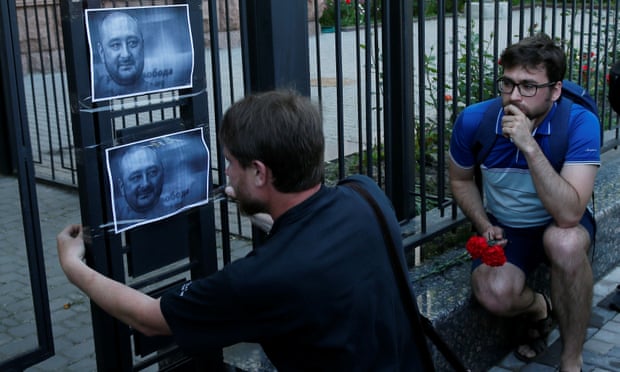The Russian foreign minister, Sergei Lavrov, has rejected a Ukrainian allegation that Moscow was behind the murder of a dissident Russian journalist in Kiev, calling it part of an anti-Russian campaign, according to Moscow media reports.
Arkady Babchenko, a critic of President Vladimir Putin, was shot dead in Ukraine on Tuesday, where he had fled into exile after a series of threats. Police in Kiev said the high-profile murder may have been linked to his reporting.
Lavrov said it was “very sad” that Moscow has been accused of the murder, according to Agence France-Presse.
The Ukrainian prime minister, Volodymyr Groysman, said in a social media posting late on Tuesday he was convinced that what he called “the Russian totalitarian machine” had not forgiven Babchenko for what Groysman called his honesty.
Babchenko, a veteran Russian war correspondent, was shot three times in the back as he left his apartment to buy bread. He was found bleeding by his wife. Babchenko, 41, died in the ambulance to the hospital, a government official said.
The killing appeared to be targeted. The gunman had apparently laid in wait for him outside his apartment. The head of Ukraine’s police force said that two motives were being considered: his “professional work and civil position”. Police on Tuesday evening had not named a suspect, but did post a sketch of a bearded man in a baseball hat.
Babchenko had grown highly critical of the Russian government in recent years. He criticised Putin’s annexation of Crimea and his support for the separatists of south-east Ukraine. He left Russia in February 2017, writing that it was “a country I no longer feel safe in”.
Alexey Navalny, the Russian opposition leader and anti-corruption campaigner, described Babchenko’s murder as “shocking”. “I have no doubt that the cause of this monstrous crime was Arkady’s public political position and his professional journalistic activities,” Navalny wrote.
“Arkasha would shoot straight from the hip every day in such a brazen manner that even those close to him felt uneasy sometimes,” wrote Pavel Kanygin, a journalist for Novaya Gazeta, referring to his friend by his nickname.
“This is a terror attack against the journalism community both in Russia and Ukraine. The killers attacked all of us by choosing the most sincere, noisy and brave one, the one who is in the public eye.”
A number of Novaya Gazeta journalists have been killed, including Anna Politkovskaya, who was gunned down in the stairwell of her Moscow apartment in 2006.
The killing was the most recent murder of a high-profile dissident in Kiev, a city that has become a refuge for some of Moscow’s most vehement critics, as well as the scene of targeted assassinations that have remained unsolved for years.
In 2016, the investigative journalist Pavel Sheremet was killed in a car bombing outside his flat. Some journalists have claimed Ukraine’s powerful intelligence agency has sought to stifle the investigation.
Babchenko’s murder quickly attracted international attention. Harlem Désir, the media freedom representative at the Organisation for Security and Cooperation in Europe, said he was horrified by Babchenko’s death. “I call on Ukraine authorities to conduct immediate & full investigation,” he tweeted.
Ukrainian and Russian officials immediately blamed one another over his death. Anton Gerashchenko, a Ukrainian lawmaker who serves as an adviser to the interior minister, said on Facebook that investigators would be looking at “Russian spy agencies’ efforts to get rid of those who are trying to tell the truth about what is going on in Russia and Ukraine”.
Alexander Bortnikov, the head of Russia’s Federal Security Service (FSB), said Ukrainian allegations the FSB was behind the killing were nonsense and a provocation, the Interfax news agency reported.
“Ukraine is becoming the most dangerous country for reporters,” the Russian lawmaker Yevgeny Revenko said in remarks carried by RIA Novosti, the state news agency. “The Ukrainian government can’t guarantee basic freedoms.”
Babchenko served as a soldier in both wars in Chechnya before turning his bleak experience into the acclaimed memoir One Soldier’s War. He served as a war correspondent for more than a decade, writing about the war in Georgia and later in southeast Ukraine.
He fled Russia in 2017 after provoking a scandal in a Facebook post that expressed indifference over the deaths of a military choir and other passengers aboard a Russian plane that crashed en route to Syria.
In the backlash, his home address was published and he received personal threats. Some called for Babchenko to be stripped of his Russian citizenship.
Original Article
Source: theguardian.com
Author: Andrew Roth

No comments:
Post a Comment